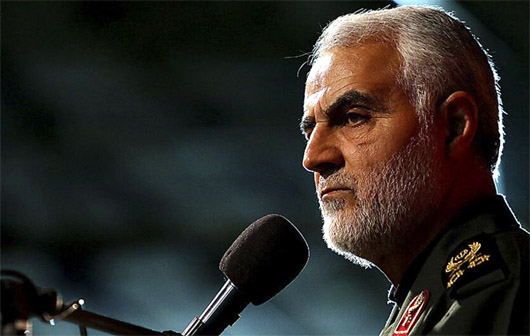Special to WorldTribune.com
Radio Free Europe / Radio Liberty
Iranian social media users have expressed mixed reactions to the killing of Iran’s most powerful military commander, General Qasem Soleimani, in a U.S. air strike in Baghdad on January 3.

Some social-media posts hailed Soleimani as a “hero” and condemned U.S. President Donald Trump for ordering his killing.
But others called Soleimani a “criminal” and “terrorist” and accused him of what they said were the deaths of thousands of people in Syria and Iraq, two countries in which he spearheaded military operations by pro-Iranian militias.
Twitter user Shahin Najafi challenged Iranian Supreme Leader Ayatollah Ali Khamenei’s announcement to hold three days of national mourning for Soleimani.
“How many days of national mourning do we need for the deaths of the young people who were massacred in [November]?” Najafi wrote, referring to Iranian authorities’ brutal crackdown on antigovernment protesters that reportedly resulted in hundreds being killed.
Amnesty International has said that at least 304 people were killed by Iran’s security forces during the unrest across Iran after the government announced steep hikes in gas prices.
“I don’t think the [Iranian] establishment will last till February 11 [the 41th anniversary of Iran’s Islamic Revolution]…” Twitter user Night_Watch0, who used the hashtag #TnxPOTUS4Soleimani, opined.
A user named Behnam Ghalam wrote that Soleimani was responsible for the deaths of “thousands of Syrians and hundreds of Iraqis” and “causing economic misery” in Iran.
Ghalam wrote that Soleimani “went to Iraq to tell the militia there to learn from Iran on how to suppress protesters. I’m happy, I’m happy for Iran and for the Middle East!”
The remark refers to massive anti-government demonstrations in Iraq that began on October 1, when people went onto the streets of Baghdad and several southern cities to protest corruption, unemployment, and foreign interference.
Iraqi forces were accused of using deadly force against protesters and hundreds were killed.
Some Iranians warned the United States that it will pay a heavy price for killing Soleimani — who oversaw Iranian military operations in the Middle East —
as he left the Iraqi capital’s airport.
“Father has gone, but father’s weapon is still with us…. Our nation is awakening,” social media user Yazdani wrote on Instagram.
Ismael said in a tweet that “[By killing Soleimani in Iraq], America wants to pit Iran and Iraq against each other.”
Some Iranians said they were worried about the repercussions of Soleimani’s killing, fearing his death could lead to an all-out military conflict and put an end to any efforts to resolve tension between Iran and the United States in talks.
“After Soleimani was killed in this way, how can [Iranian President Hassan] Rohani sit at the negotiation table with America and sign an agreement?” Rahel wrote on Twitter.
“The smell of war is in the air,” wrote Instagram user A.M.
One Iranian social-media user wrote that he was surprised by state-run Press TV’s statement that claimed “all the Iranian people have called for revenge against America and that 82 percent of Iranians hate America.”
“Am I missing something? Have I fallen asleep for a century during which [Iranians] began to hate America?” he asked with sarcasm.
Similar sentiments were expressed in many audio messages sent by Iranians to RFE/RL’s Radio Farda.
“The Iranian establishment’s announcement of national mourning is a mourning that will be held only by the establishment. It has nothing to do with the Iranian people!” one message said. “It’s a mourning period that will be observed by Khamenei and his circle.”
